Firm Dynamics and Employment Outcomes
The group “Firm Dynamics and Employment Outcomes” analyses the foundation, evolution, and failure of firms, and subsequent consequences for individuals and regions. The group works on research questions around firm behaviour to explain recent phenomena such as business dynamism slowdown and wage inequality.
A central question to understand firm dynamism, mobility, innovation and the process of creative destruction is on the role of government interference. In this respect, the team analyses how connections of firms to politicians shape the business environment and to what extent firms benefit from having a political connection.
At the firm level, the group studies performance measures such as employment, sales, and market exit and investigates public procurement contracts, subsidies and political initiatives in terms of law proposals and draft laws that implicitly may generate higher entry barriers and distorts competition. This research will be informative for the overall economic environment and economic prosperity.
The way economies generate economic prosperity is central to our understanding of social mobility and welfare. Over the last three decades, Germany and the United States have shown similar productivity improvements. The way these improvements have been generated, however, differ remarkably. While startups in the United States are well-known for their innovation and radical advancements, the German business model relies to a large extent on established incumbent firms in the process of innovation and new technologies. The research group considers empirically and theoretically the role of entrepreneurship in this process and how it differs between Germany and the United States.
Understanding firm behaviour and the role of firms in our society contributes to the political and academic discussion on wage inequality and regional disparities. The sorting process of high productive workers into high productive firms has amplified over the last three decades with important implications for wages and aggregate inequality. Thus, the group examines the consequences of wage inequality between firms and to what extent selective mobility contributes to wage disparities.
The research group “Firm Dynamics and Employment Outcomes” further studies implications of innovative activities in the form of patenting on within-firm wage inequality. Examining impacts of new technologies and worker-level consequences will be informative about winners and losers in our society and informs policy makers on how to take action in terms of reskilling certain groups of the workforce.
The research group makes use of various administrative, survey and hand-collected data. The Establishment History Panel (BHP) provided by the Institute for Employment Research (IAB) and the Mannheim Enterprise Panel (MUP) provided by the Leibniz Centre for European Economic Research (ZEW) provide firm-level information on the performance of firms over time. At the individual level, IAB’s Integrated Employment Biographies (IEB) allows to study regional and wage mobility patterns of workers. European Patent Office data provide the basis for patenting activities. Web-scraped and survey data on political activities and opinions are exploited to study differential behaviour of politicians in parliament.
Workpackage 1: Business Dynamism, Firm Performance and Political Connections
Workpackage 2: Wage Inequality, Innovation and Firms
Workpackage 3: Shades of Capitalism: The Role of Entrepreneurship for Innovation and Business Dynamism in Germany and the United States
Research Cluster
Productivity and InstitutionsYour contact

- Department Structural Change and Productivity
EXTERNAL FUNDING
01.2020 ‐ 06.2024
The Rise of Populist Parties in Europe: The Dark Side of Globalization and Technological Change?
VolkswagenStiftung
Globalisation may have increased prosperity in general, but has also led to unemployment, wage inequality, outward migration and, thus, ageing populations in many European regions. This project examines whether these economic burdens lead to votes for populist parties.
01.2019 ‐ 06.2022
MICROPROD („Raising EU Productivity: Lessons from Improved Micro Data“)
Europäische Kommission
The goal of MICROPROD is to contribute to a greater understanding of the challenges brought about in Europe by the fourth industrial revolution and the associated ‘productivity puzzle’ in a context of globalisation and digitisation, and to provide alternative policy options to better address these challenges.
This project has received funding from the European Union’s Horizon 2020 research and innovation programme under grant agreement No 764810.
07.2018 ‐ 12.2020
Firm Wage Differentials in Imperfect Labour Markets: The Role of Market Power and Industrial Relations in Rent Splitting between Workers and Firms
German Research Foundation (DFG)
The main purpose of this proposal is to grasp a firmer understanding of how employment rents are split between workers and employers in imperfect labour markets and how labour market institutions, such as unions and works councils, influence the distribution of rents. In that it not only promises new insights into the wage formation process and the likely consequences of important labour market trends like falling unionisation and worker codetermination, but also promises to inform important public policy debates, such as which rights should be granted to organised labour.
02.2019 ‐ 09.2019
Evaluation of the IAB Establishment Panel 2018 and Preparation of a Results Report for West and East Germany
Final report: Fehlende Fachkräfte in Deutschland – Unterschiede in den Betrieben und mögliche Erklärungsfaktoren: Ergebnisse aus dem IAB-Betriebspanel 2018. IAB-Forschungsbericht 10/2019. (in German, English abstract available)
04.2016 ‐ 03.2019
Wage and Employment Effects of Bankruptcies
German Research Foundation (DFG)
The project analyzes the process and the consequences of firm failure. For the first time, evidence on the consequences of small firms’ bankruptcy on employees’ earnings and wages is provided. The project e.g. shows that employees of small firms are more likely to see their employer failing but, at the same time, face smaller earnings and wage losses than employees displaced from larger firms. Check the below research articles for further insights.
01.2018 ‐ 12.2018
Evaluation of the IAB Establishment Panel 2017 and Preparation of a Results Report for West and East Germany
Final report: Lohnunterschiede zwischen Betrieben in Ost- und Westdeutschland: Ausmaß und mögliche Erklärungsfaktoren. Ergebnisse aus dem IAB-Betriebspanel 2017. IAB-Forschungsbericht 6/2018. (in German, English abstract available)
01.2017 ‐ 09.2017
Evaluation of the IAB Establishment Panel 2016 and Preparation of a Results Report for West and East Germany
Final report: Produktivitätsunterschiede zwischen West- und Ostdeutschland und mögliche Erklärungsfaktoren. Ergebnisse aus dem IAB-Betriebspanel 2016. IAB-Forschungsbericht 16/2017. (in German, English abstract available)
Refereed Publications
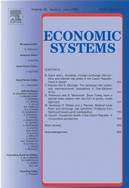
FDI, Human Capital and Income Convergence — Evidence for European Regions
in: Economic Systems, No. 2, 2016
Abstract
This study examines income convergence in regional GDP per capita for a sample of 269 regions within the European Union (EU) between 2003 and 2010. We use an endogenous broad capital model based on foreign direct investment (FDI) induced agglomeration economies and human capital. By applying a Markov chain approach to a new dataset that exploits micro-aggregated sub-national FDI statistics, the analysis provides insights into regional income growth dynamics within the EU. Our results indicate a weak process of overall income convergence across EU regions. This does not apply to the dynamics within Central and East European countries (CEECs), where we find indications of a poverty trap. In contrast to FDI, regional human capital seems to be associated with higher income levels. However, we identify a positive interaction of FDI and human capital in their relation with income growth dynamics.
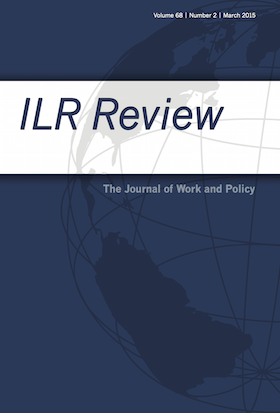
Dual Labor Markets at Work: The Impact of Employers’ Use of Temporary Agency Work on Regular Workers’ Job Stability
in: ILR Review, No. 5, 2016
Abstract
Fitting duration models on an inflow sample of jobs in Germany starting in 2002 to 2010, the author investigates the impact of employers’ use of temporary agency work on regular workers’ job stability. In line with dual labor market theory, the author finds that nontemporary jobs are significantly more stable when employers use temporary agency workers. The rise in job stability stems mainly from reduced transitions into nonemployment, suggesting that nontemporary workers are safeguarded against involuntary job losses. The findings are robust to controlling for unobserved permanent employer characteristics and changes in the observational window that comprises the labor market disruption of the Great Recession.
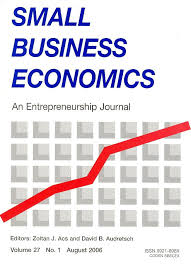
Spinoffs in Germany: Characteristics, Survival, and the Role of their Parents
in: Small Business Economics, No. 1, 2016
Abstract
Using a 50 % sample of all private sector establishments in Germany, we report that spinoffs are larger, initially employ more skilled and more experienced workers, and pay higher wages than other startups. We investigate whether spinoffs are more likely to survive than other startups, and whether spinoff survival depends on the quality and size of their parent companies, as suggested in some of the theoretical and empirical literature. Our estimated survival models confirm that spinoffs are generally less likely to exit than other startups. We also distinguish between pulled spinoffs, where the parent company continues after they are founded, and pushed spinoffs, where the parent company stops operations. Our results indicate that in western and eastern Germany and in all sectors investigated, pulled spinoffs have a higher probability of survival than pushed spinoffs. Concerning the parent connection, we find that intra-industry spinoffs and spinoffs emerging from better-performing or smaller parent companies are generally less likely to exit.
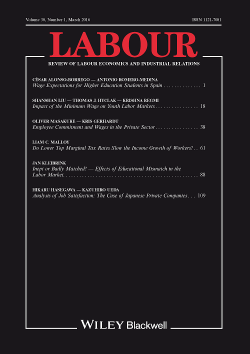
How Selective Are Real Wage Cuts? A Micro-analysis Using Linked Employer–Employee Data
in: LABOUR: Review of Labour Economics and Industrial Relations, No. 4, 2015
Abstract
Using linked employer–employee panel data for Germany, we investigate whether firms implement real wage reductions in a selective manner. In line with insider–outsider and several strands of efficiency wage theory, we find strong evidence for selective wage cuts with high-productivity workers being spared even when controlling for permanent differences in firms' wage policies. In contrast to some recent contributions stressing fairness considerations, we also find that wage cuts increase wage dispersion among peers rather than narrowing it. Notably, the same selectivity pattern shows up when restricting our analysis to firms covered by collective agreements or having a works council.

Does the Plant Size–wage Differential Increase with Tenure? Affirming Evidence from German Panel Data
in: Economics Letters, 2015
Abstract
We show that the major part of the plant size–wage premium in Germany is reflected in different wage growth patterns in plants of different size. This is consistent with the hypothesis that large firms ‘produce’ more skilled workers over time.
Working Papers
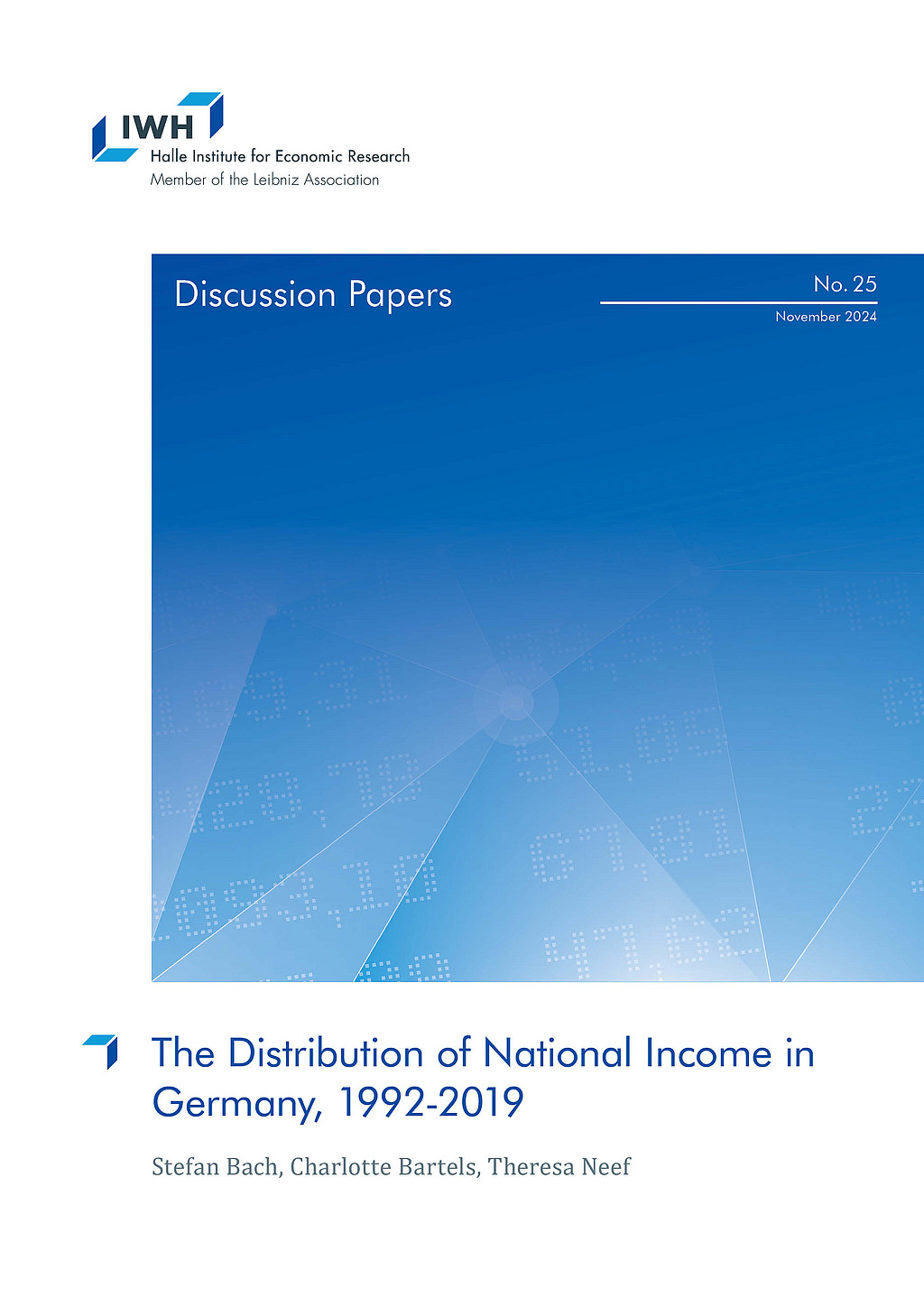
The Distribution of National Income in Germany, 1992-2019
in: IWH Discussion Papers, No. 25, 2024
Abstract
<p>This paper analyzes the distribution and composition of pre-tax national income in Germany since 1992, combining personal income tax returns, household survey data, and national accounts. Inequality rose from the 1990s to the late 2000s due to falling labor incomes among the bottom 50% and rising incomes in the top 10%. This trend reversed after 2007 as labor incomes across the bottom 90% increased. The top 1% income share, dominated by business income, remained relatively stable between 1992 and 2019. A large share of Germany’s top 1% earners are non-corporate business owners in labor-intensive professions. At least half of the business owners in P99-99.9 and a quarter in the top 0.1% operate firms in professional services – a pattern mirroring the United States. From 1992 to 2019, Germany’s top 0.1% income concentration exceeded France’s and matched U.S. levels until the late 2000s.</p>
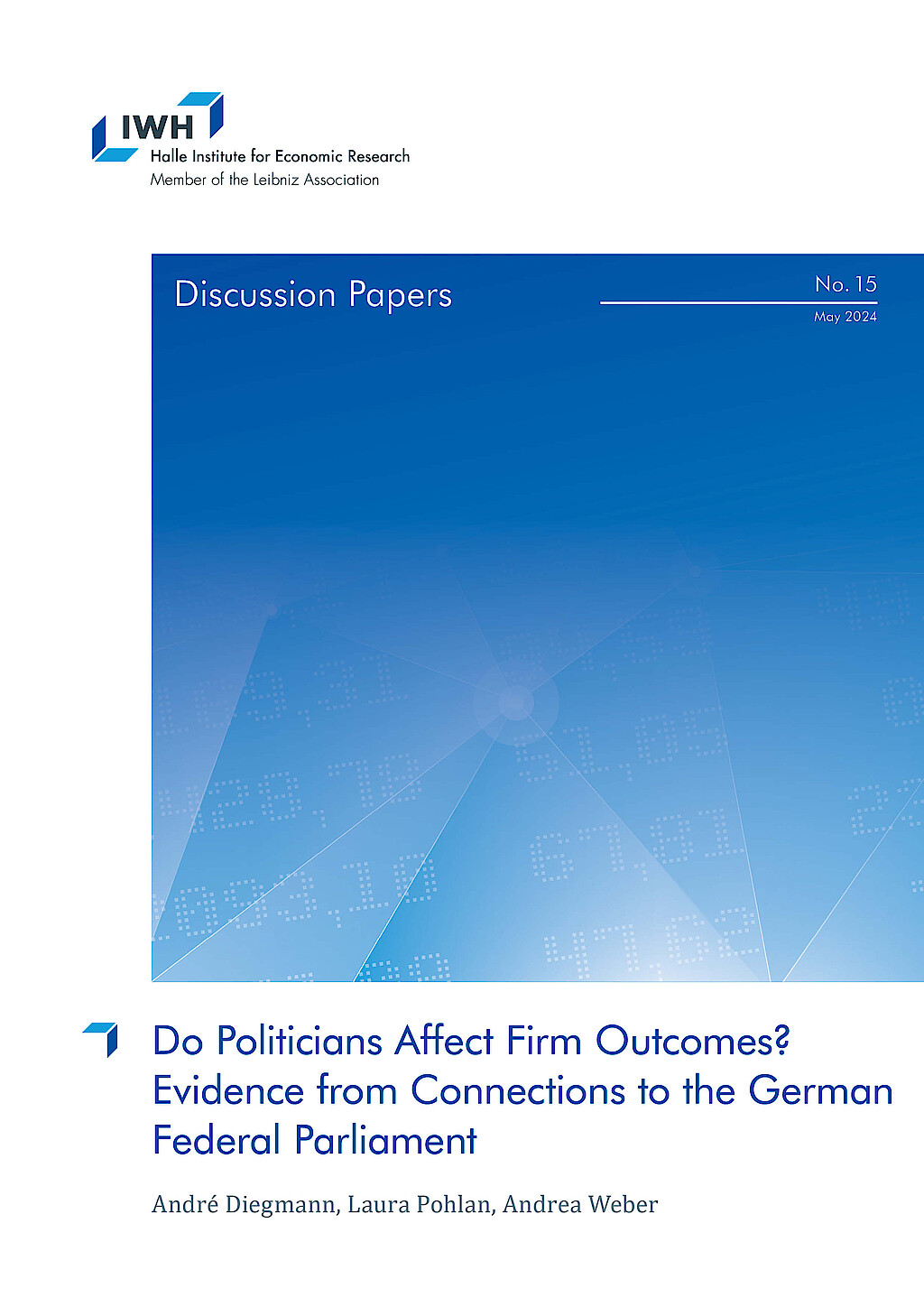
Do Politicians Affect Firm Outcomes? Evidence from Connections to the German Federal Parliament
in: IWH Discussion Papers, No. 15, 2024
Abstract
<p>We study how connections to German federal parliamentarians affect firm dynamics by constructing a novel dataset linking politicians and election candidates to the universe of firms. To identify the causal effect of access to political power, we exploit (i) new appointments to the company leadership team and (ii) discontinuities around the marginal seat of party election lists. Our results reveal that connections lead to reductions in firm exits, gradual increases in employment growth without improvements in productivity. Adding information on credit ratings, subsidies and procurement contracts allows us to distinguish between mechanisms driving the effects over the politician’s career.</p>
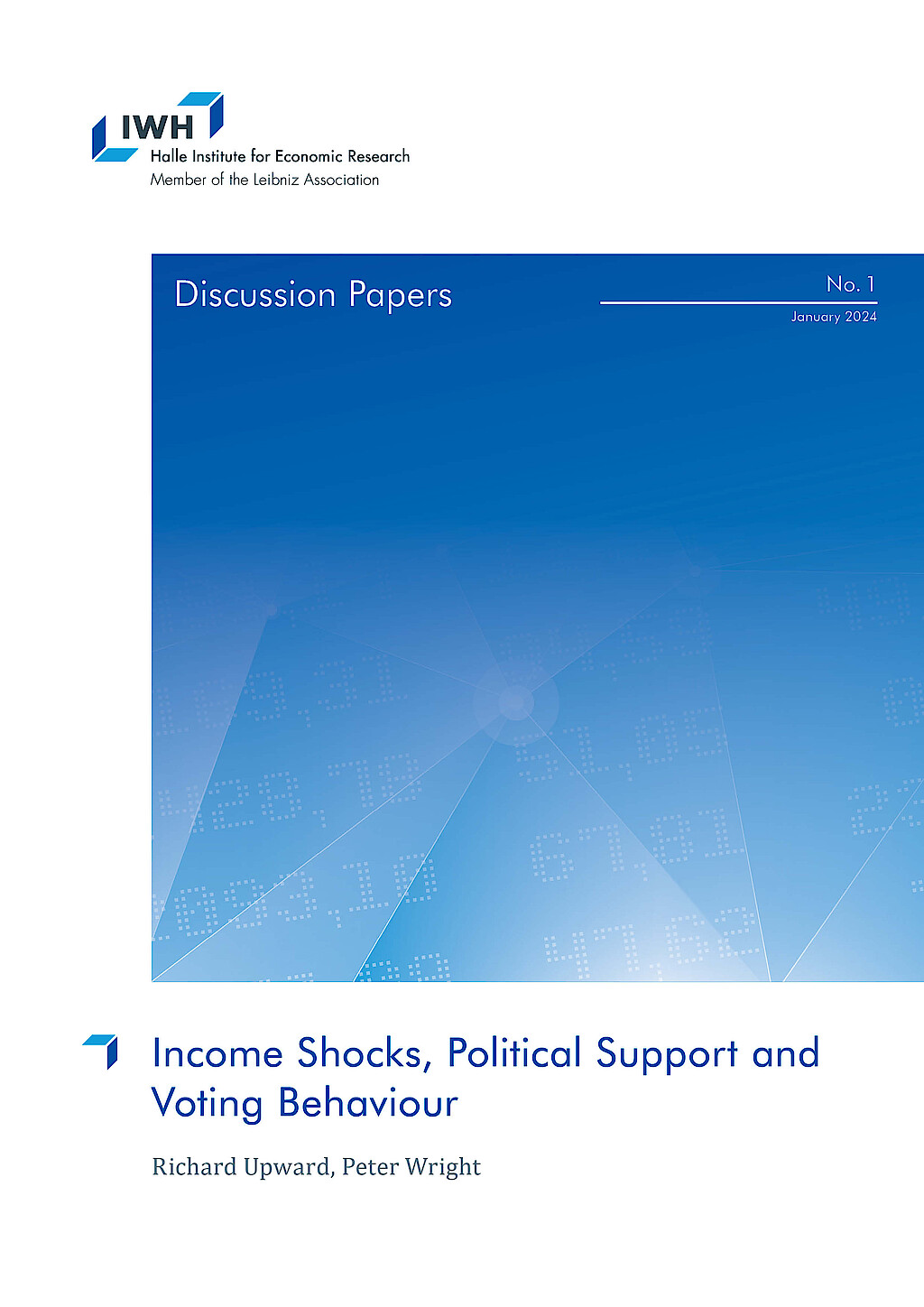
Income Shocks, Political Support and Voting Behaviour
in: IWH Discussion Papers, No. 1, 2024
Abstract
We provide new evidence on the effects of economic shocks on political support, voting behaviour and political opinions over the last 25 years. We exploit a sudden, large and long-lasting shock in the form of job loss and trace out its impact on individual political outcomes for up to 10 years after the event. The availability of detailed information on households before and after the job loss event allows us to reweight a comparison group to closely mimic the job losers in terms of their observable characteristics, pre-existing political support and voting behaviour. We find consistent, long-lasting but quantitatively small effects on support and votes for the incumbent party, and short-lived effects on political engagement. We find limited impact on the support for fringe or populist parties. In the context of Brexit, opposition to the EU was much higher amongst those who lost their jobs, but this was largely due to pre-existing differences which were not exacerbated by the job loss event itself.
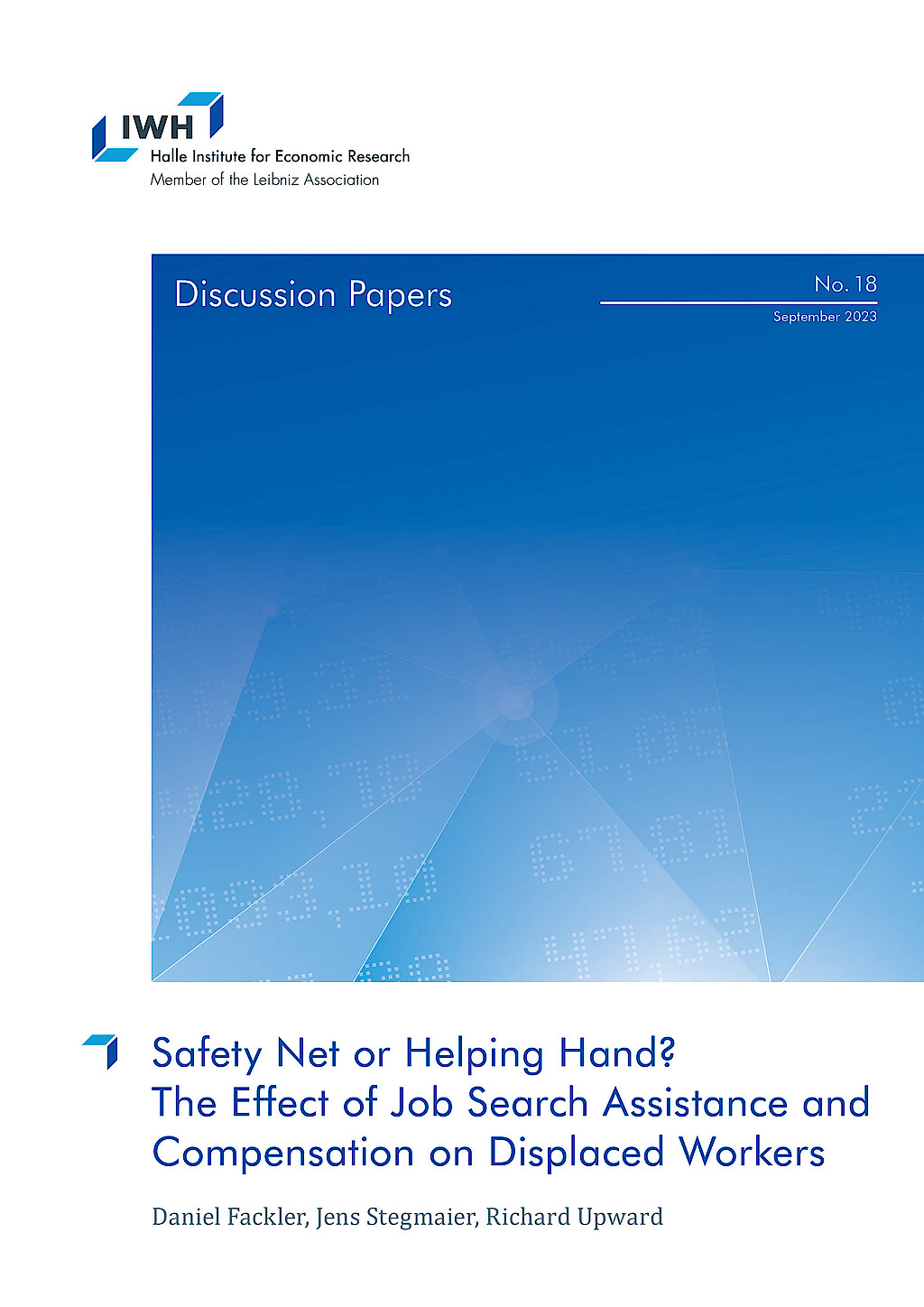
Safety Net or Helping Hand? The Effect of Job Search Assistance and Compensation on Displaced Workers
in: IWH Discussion Papers, No. 18, 2023
Abstract
We provide the first systematic evidence on the effectiveness of a contested policy in Germany to help displaced workers. So-called “transfer companies” (<i>Transfergesellschaften</i>) employ displaced workers for a fixed period, during which time workers are provided with job-search assistance and are paid a wage which is a substantial fraction of their pre-displacement wage. Using rich and accurate data on workers’ employment patterns before and after displacement, we compare the earnings and employment outcomes of displaced workers who entered transfer companies with those that did not. Workers can choose whether or not to accept a position in a transfer company, and therefore we use the availability of a transfer company at the establishment level as an IV in a model of one-sided compliance. Using an event study, we find that workers who enter a transfer company have significantly worse post-displacement outcomes, but we show that this is likely to be the result of negative selection: workers who lack good outside opportunities are more likely to choose to enter the transfer company. In contrast, ITT and IV estimates indicate that the use of a transfer company has a positive and significant effect on employment rates five years after job loss, but no significant effect on earnings. In addition, the transfer company provides significant additional compensation to displaced workers in the first 12 months after job loss.
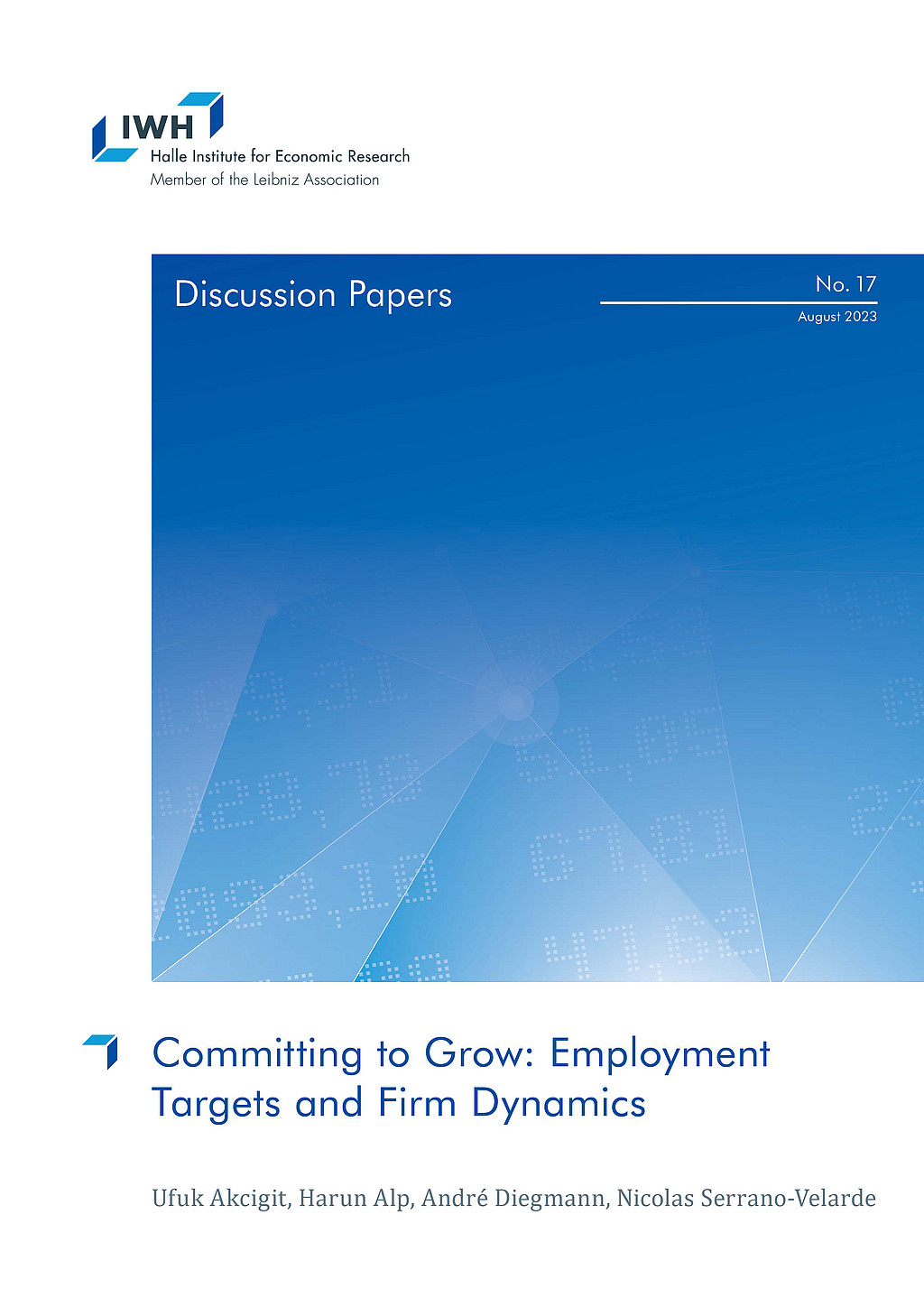
Committing to Grow: Employment Targets and Firm Dynamics
in: IWH Discussion Papers, No. 17, 2023
Abstract
<p>We examine effects of government-imposed employment targets on firm behavior. Theoretically, such policies create “polarization,“ causing low-productivity firms to exit the market while others temporarily distort their employment upward. Dynamically, firms are incentivized to improve productivity to meet targets. Using novel data from East German firms post-privatization, we find that firms with binding employment targets experienced 25% higher annual employment growth, a 1.1% higher annual exit probability, and 10% higher annual productivity growth over the target period. Structural estimates reveal substantial misallocation of labor across firms and that subsidizing productivity growth would yield twice the long term increases in employment.</p>
















